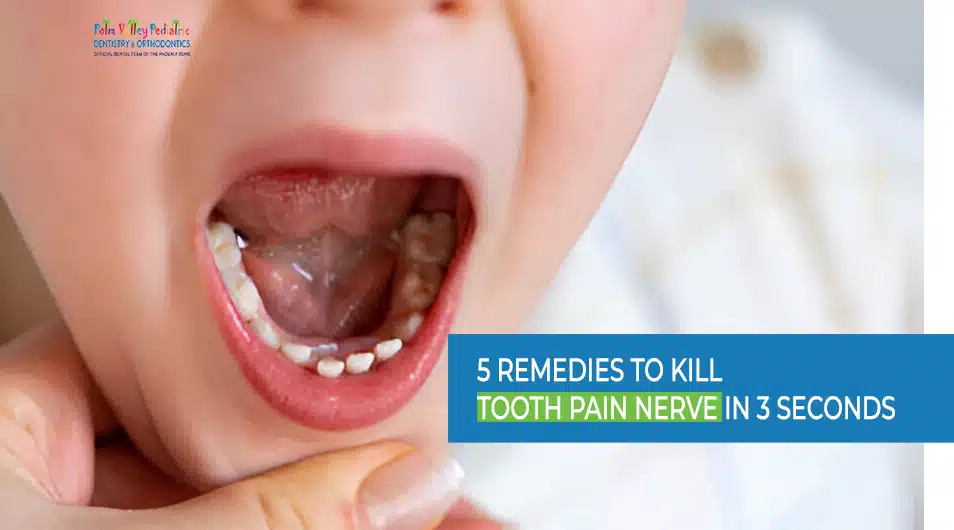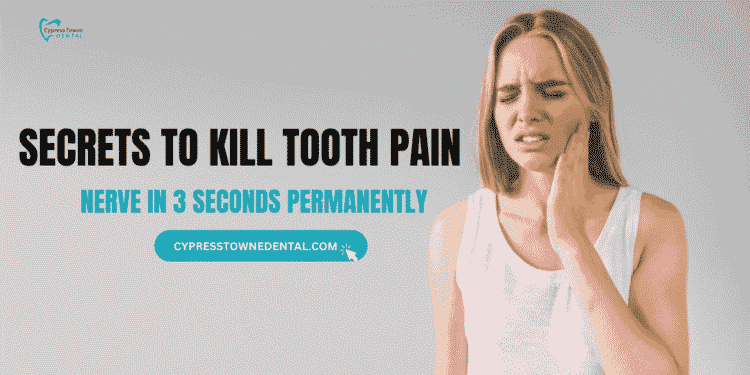Tooth pain is one of the most unbearable sensations a person can experience. Whether it’s a sharp, throbbing, or constant ache, it can disrupt your sleep, work, and overall quality of life. Naturally, many people search online for fast solutions, including how to kill tooth pain nerve in 3 seconds permanently. While the idea of such instant relief sounds appealing, it’s important to understand what’s realistically possible, what methods are safe, and which options offer real, long-term solutions.
In this article, we’ll break down the causes of tooth nerve pain, the myths around “3-second permanent fixes,” and the best medically-sound options available to stop the pain once and for all.
What Causes Tooth Nerve Pain?
To understand how to kill tooth pain nerve in 3 seconds permanently, you first need to know what causes this type of pain in the first place. The dental nerve, located in the pulp of your tooth, becomes exposed or inflamed due to several reasons:
-
Deep cavities or decay
-
Cracked or chipped tooth
-
Gum disease
-
Abscess or infection
-
Teeth grinding (bruxism)
When the nerve is inflamed or infected, it sends intense pain signals to the brain. This pain can come and go, or persist continuously, becoming worse at night or after eating or drinking.
Is It Really Possible to Kill Tooth Pain Nerve in 3 Seconds Permanently?
Let’s be clear: there is no safe, medically-approved way to kill a tooth nerve in exactly 3 seconds permanently at home. The phrase “kill tooth pain nerve in 3 seconds permanently” is often used in viral content, videos, or clickbait-style posts online. But in reality, pain relief that fast and permanent requires professional dental intervention.
That said, some emergency remedies can temporarily numb the nerve pain very quickly, and professional procedures can kill the nerve permanently.
Let’s explore both short-term relief and permanent solutions.
Fast Relief Options for Tooth Nerve Pain
While these methods won’t actually kill tooth pain nerve in 3 seconds permanently, they may reduce or numb the pain within minutes:
1. Clove Oil
Clove oil contains eugenol, a natural anesthetic and antibacterial compound. Apply a small amount to a cotton ball and press it against the painful tooth. Relief can occur within seconds and last for several hours.
2. Ice Pack or Cold Compress
Applying an ice pack on the cheek near the painful area can temporarily numb the nerves and reduce inflammation.
3. Hydrogen Peroxide Rinse
A mild hydrogen peroxide rinse (3% solution diluted with equal parts water) can help reduce bacteria and relieve pain from an infected tooth.
4. Saltwater Rinse
Rinsing your mouth with warm salt water can help reduce inflammation and clean the infected area.
5. Over-the-Counter Painkillers
Medications like ibuprofen or acetaminophen can provide fast relief by reducing inflammation and blocking pain signals.
Remember, none of these methods will kill tooth pain nerve in 3 seconds permanently, but they can give you enough time to get to a dentist.

Permanent Solutions: Dental Procedures That Remove the Nerve
To kill tooth pain nerve in 3 seconds permanently, your only real, lasting option is professional dental treatment. Here are the primary methods:
1. Root Canal Treatment
A root canal is the most common procedure used to remove the tooth nerve permanently. The dentist drills into the tooth, removes the infected or inflamed nerve, and seals the canal to prevent further infection. Once the nerve is gone, the pain disappears permanently.
2. Tooth Extraction
If the tooth is too damaged to save, it may be removed entirely. This is a more aggressive option but will ensure that the nerve causing pain is completely gone.
3. Pulpotomy (in children)
For children with baby teeth that are infected or painful, a pulpotomy may be performed to remove part of the nerve, relieving pain until the tooth falls out naturally.
Again, none of these procedures happen in 3 seconds, but they are the only true way to kill tooth pain nerve in 3 seconds permanently in terms of final, long-term relief—when performed correctly and professionally.
Common Myths About Killing Tooth Pain Fast
Because the internet is filled with DIY solutions, it’s important to address dangerous myths:
-
Myth 1: Applying alcohol or bleach will kill the nerve instantly.
🚫 Dangerous and can lead to chemical burns or infections. -
Myth 2: Burning the nerve with a hot object works.
🚫 Extremely harmful and can damage your gums, jawbone, and surrounding tissue. -
Myth 3: Pulling the tooth yourself will end the pain.
🚫 Very risky. You can cause infection, excessive bleeding, and serious complications.
While people are desperate to kill tooth pain nerve in 3 seconds permanently, trusting unsafe remedies can cause more harm than good.
When to Seek Emergency Dental Care
If you’re experiencing any of the following, you need to see a dentist immediately:
-
Severe, throbbing pain that doesn’t go away
-
Swelling in the face or jaw
-
Fever or chills (sign of infection)
-
Pus or drainage near the tooth
-
Difficulty eating, drinking, or sleeping due to pain
In these cases, the nerve may already be infected or dying, and a root canal or extraction will likely be required.
Can Natural Remedies Kill the Nerve Over Time?
Some people look to natural remedies to avoid dental procedures. While remedies like garlic, turmeric paste, or essential oils can reduce inflammation and bacteria, they cannot kill the nerve permanently. At best, they serve as short-term relief and should never replace professional care.
Final Thoughts
It’s easy to understand why someone would search for how to kill tooth pain nerve in 3 seconds permanently—tooth pain is excruciating, and people want fast relief. But real, permanent pain elimination doesn’t happen instantly and cannot be achieved safely without a dentist’s help.
Temporary relief is possible at home with natural numbing agents and OTC pain relievers, but the only true way to remove the source of the pain is through procedures like root canal therapy or tooth extraction.
If you’re suffering from severe tooth pain, don’t delay. Seek professional dental help as soon as possible. That’s the real path to permanent relief—and to finally stop the suffering caused by a damaged or infected tooth nerve.




